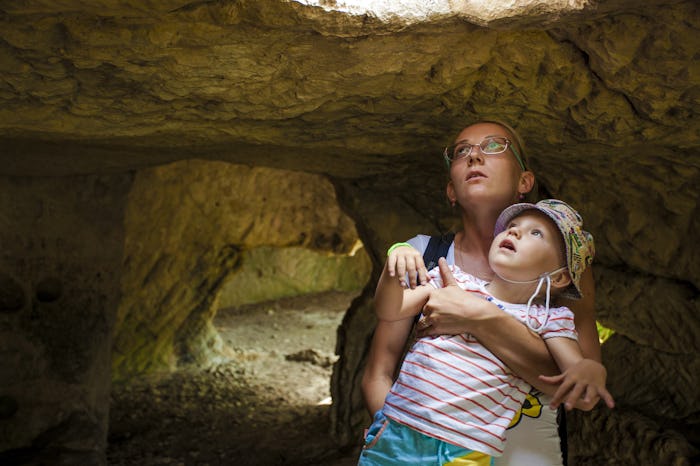Life

8 Things Cave Parents Did That No Parent Would Even Think About Doing Today
For many parents, the idea of living without many modern conveniences is terrifying. Better education, medical advances, and evolutions in technology aid parents tremendously. I mean, imagine parenting without a crib, diapers, bottles, or toys. Cave people living in the Stone Age lacked what we consider to be "baby essentials," so I, for one, am thankful there are things cave parents did that no parent would do today.
My partner likes to go camping, and I take those instances as an opportunity to gain some insight into the way people lived thousands of years ago. All of our comforts are left at home and we have to "rough it" in the wild. (Look, a tent and a cell phone is still "roughing it," OK. Don't fight me on this.)
Fine, you guys. Camping isn't the same as living like prehistoric cave people. I'll give you that, OK? However, many of the things that make parenting easier are left at home and I, personally, miss my modern luxuries. Anything that requires electricity gets left at home so that means no baby monitor, no tablet with kid-friendly shows, and no hair appliances for mom. It's easy to see why roughing it like a cave person is not this city-loving mom's favorite pastime.
They Let Their Kids Draw On Walls
My son took a green crayon to his bedroom wall the other day. As you might imagine, I was not impressed. However, children in the stone age were actually encouraged to draw on the walls of their cave (read: home). Can you even imagine?
Their Kids Didn't Wear Shoes
Cave children went barefoot from birth to adulthood, walking through mud, mulch, and forest floors with nothing to protect their feet. I honestly shudder just thinking about it.
One of my favorite things to do when my son was brand new was to stroke his velvet soft feet. The idea of letting him walk around outside without any protective footwear at all is unthinkable.
They Let Their Kids Fight Fires
My toddler already loves camping, just like his dad, and he thinks sitting around the campfire is just awesome.
Cave parents encouraged (and even taught) their children to make and stoke the campfires themselves. These skills were essential to their survival, but has this nervous mom wondering about the number of accidents that must have occurred. (Hint: a lot. The average life expectancy was only 35.)
They Cleaned Their Kids' Teeth With Blades Of Grass
I find it really difficult to get my son to brush his teeth regularly and often have to tackle him down and jam the brush in his mouth. Toothbrushes and toothpaste were yet to be invented, so cave children gave their teeth a quick wipe with blades of grass.
They Worried About Wild Animals Eating Their Kids (Yikes)
Cave parents had to worry about an awful lot of predators; bears and lions and tigers, oh my!
Crying babies could attract dangerous animals, essentially threatening the safety of the entire community. As a result, parents probably did everything they could to keep their little ones quiet (especially during the long cold nights).
They Fed Their Kids Raw Food
Cave people could light fires, sure, but much of their diet came from foraged foods and raw meats. They simply didn't have the knowledge to worry about food poisoning and, in many ways, cave children actually had a much healthier diet than children of today. Whoa.
They Constantly Wore Their Babies
Cave mamas wore their baby's most of the time. After all, keeping them off the floor and away from possible predators was absolutely vital to the continued life of the child.
However, cave moms still needed to go about their work, which included; hunting, foraging, preparing and cooking food, and basic farming. They did the aforementioned while wearing their babies. I mean, can you imagine hunting with a 6-month-old baby attached to your chest? These moms were badasses.
They Practiced Body Modification On Their Babies
Depending on a group's tribe affiliation, cave children and children of indigenous groups had tattoos, markings, piercings, or other forms of body modification that mark them as a member of a very specific tribe. Usually, these modifications were highlighted by an initiation ceremony, considered a high honor and a rite of passage in any child's life. Sure, modern-day parents might make the decision to pierce their babies' ears, but you won't see a toddler sporting a tattoo anytime soon.